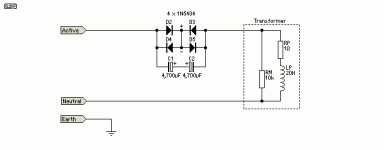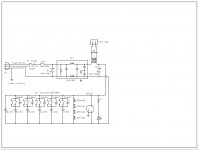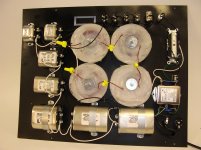Absolutely.......The most effective place to attenuate spikes is at the source..........
Never forget. Stopping the interference at source is always the "best" way.
How are the music system output sockets fed from the distribution board?
How are the "heating system" outputs fed from the distribution board.
I would suggest that these two supplies should be quite separate from each other, sharing only the terminals at the distribution board.
How are the "heating system" outputs fed from the distribution board.
I would suggest that these two supplies should be quite separate from each other, sharing only the terminals at the distribution board.
Merlin,
I tried to provide a link to a technical pdf at the Kemet/Rifa site, unsuccessfully.
You can get it here -
FEBG - RC Snubber Capacitors
and click on the link 'Technical info specific to RC snubber networks'
in the upper left. But the information is much the same as Zigzagflux's url -
http://www.paktron.com/pdf/Quencharc_QRL.pdf
zigzagflux would offer you better advice on the appropriate values for a series connected resistor- capacitor, that comprises a snubber, than I could.
Hopefully, Mike567's suspicion of a faulty motor run and/or start capacitor will prove true, and be easily replaced, solving your problem. Otherwise, it may well be relay/switch contact switching noise requiring appropriate snubbing. Occasionally, furnace/boiler manufacturers have available noise snubbing kits.
Regards,
Paul
Thanks for help Paul, I will try 0,1uF + 100R across live & neutral, how many watts must be rated the resistor?
How are the music system output sockets fed from the distribution board?
How are the "heating system" outputs fed from the distribution board.
I would suggest that these two supplies should be quite separate from each other, sharing only the terminals at the distribution board.
Audio system have his own separate AC line sharing only the terminals at the distribution board.
I had my Buffalo 32 dropout ( = resynching) each time i switched the ceiling lights on, even if i had a felix mains conditioner on the AC of the dac. Now that you mention this each time my heater went on it did the same thing. A simple DC filter cured these dropouts forever. See the support forums on twisted pear.😉
I had a class d amp blow up because I had a fluorescent light within a few inches.
I could see the high frequency on my scope.
Its clear that interference is radiated and as well as conducted.
I could see the high frequency on my scope.
Its clear that interference is radiated and as well as conducted.
I had my Buffalo 32 dropout ( = resynching) each time i switched the ceiling lights on, even if i had a felix mains conditioner on the AC of the dac. Now that you mention this each time my heater went on it did the same thing. A simple DC filter cured these dropouts forever. See the support forums on twisted pear.😉
Could you elaborate or post the exact link to see the simple DC filter used in the TP support forums because I looked for & don't see nothing?
Merlin,
The capacitive reactance of a 0.1uf cap @50 Hz > 30kOhms so the theoretical power rating of the series resistor should not be very high. I'd think a 2 watt carbon composition would be appropriate. But note, I wrote 'theoretical', and would defer to those with real experience with quenching snubbers. Better yet, I'd suggest using a purpose built encapsulated snubber from Kemet/Rifa -
FEBG - RC Snubber Capacitors
or
http://www.paktron.com/pdf/Quencharc_QRL.pdf
If you do a search on 'dc blocker' here on DiyAudio, you'll find a number of schematics along with discussion.
C37,
I'm surprised that a dc blocker would address spike issues. A DC spike is inherently an AC signal and a dc blocker would, at best, remove 1 or 2 diode forward drops, < 4v. Then again, if it fixes the problem, be happy...
Which CMC are you using in you Felix that feeds your DAC?
The Felix [its my design from Audiocircle, albeit quite derivative] is not designed to provide spike protection, as the 8uh leakage/ differential inductance of a JWM 8120 2.4 mH 17 amp CMC will not have much effect. But if you're using a Felix with the 3amp CoilCraft P3717 with its purposely designed in 1 mH leakage/differential inductance, it should attenuate the spike reasonably well. This would lead me to believe that the disruptive spike is radiated, rather than conducted, but the positive effect of the dc blocker would seem to rule that out.
Regards,
Paul
The capacitive reactance of a 0.1uf cap @50 Hz > 30kOhms so the theoretical power rating of the series resistor should not be very high. I'd think a 2 watt carbon composition would be appropriate. But note, I wrote 'theoretical', and would defer to those with real experience with quenching snubbers. Better yet, I'd suggest using a purpose built encapsulated snubber from Kemet/Rifa -
FEBG - RC Snubber Capacitors
or
http://www.paktron.com/pdf/Quencharc_QRL.pdf
If you do a search on 'dc blocker' here on DiyAudio, you'll find a number of schematics along with discussion.
C37,
I'm surprised that a dc blocker would address spike issues. A DC spike is inherently an AC signal and a dc blocker would, at best, remove 1 or 2 diode forward drops, < 4v. Then again, if it fixes the problem, be happy...
Which CMC are you using in you Felix that feeds your DAC?
The Felix [its my design from Audiocircle, albeit quite derivative] is not designed to provide spike protection, as the 8uh leakage/ differential inductance of a JWM 8120 2.4 mH 17 amp CMC will not have much effect. But if you're using a Felix with the 3amp CoilCraft P3717 with its purposely designed in 1 mH leakage/differential inductance, it should attenuate the spike reasonably well. This would lead me to believe that the disruptive spike is radiated, rather than conducted, but the positive effect of the dc blocker would seem to rule that out.
Regards,
Paul
Hi Felipe and Paul,
If I understood well what is at hand here is dropouts from Felipe's buffalo dac. Since i had exactely the same symptoms he mentioned, i though i would share what worked for me- i don't claim a dc block removes spikes, but rather dc is something to look at if the dac dropouts (among other things)
I found this hint by Russ here: Buffalo Sensitive to EMI? - Buffalo DAC - Twisted Pear Audio Support (2nd post) and since a dc block is so easy to build i did one immediately and that solved my problem presto.
I'm sure Felipe who is a keen diy'er has a diode bridge and a couple of caps lying around that he could test immediately 🙂 hope it fixes it.
Best,
Thomas
If I understood well what is at hand here is dropouts from Felipe's buffalo dac. Since i had exactely the same symptoms he mentioned, i though i would share what worked for me- i don't claim a dc block removes spikes, but rather dc is something to look at if the dac dropouts (among other things)
I found this hint by Russ here: Buffalo Sensitive to EMI? - Buffalo DAC - Twisted Pear Audio Support (2nd post) and since a dc block is so easy to build i did one immediately and that solved my problem presto.
I'm sure Felipe who is a keen diy'er has a diode bridge and a couple of caps lying around that he could test immediately 🙂 hope it fixes it.
Best,
Thomas
Hi Felipe and Paul,
If I understood well what is at hand here is dropouts from Felipe's buffalo dac. Since i had exactely the same symptoms he mentioned, i though i would share what worked for me- i don't claim a dc block removes spikes, but rather dc is something to look at if the dac dropouts (among other things)
I found this hint by Russ here: Buffalo Sensitive to EMI? - Buffalo DAC - Twisted Pear Audio Support (2nd post) and since a dc block is so easy to build i did one immediately and that solved my problem presto.
I'm sure Felipe who is a keen diy'er has a diode bridge and a couple of caps lying around that he could test immediately 🙂 hope it fixes it.
Best,
Thomas
Hi Thomas.
Thanks for advice, I will try with this DC block
Cheers,
Felipe
Attachments
Not fixed.😡
Damn. Did your read the rest of the link before? He fixed it like this " FIXED! I jumpered the ground terminal to the - terminal for each S/PDIF input and the problem is gone"
Could this also be useful in your case?
¿can you verified the earth point, is OK?.
If only this switch make the spikes:
you need a varistor in paralel with the switch of start burner in heater, or a varistor in the mains AC of heater.
If only this switch make the spikes:
you need a varistor in paralel with the switch of start burner in heater, or a varistor in the mains AC of heater.
This is from an old Audioxpress article, it no longer seems to be on the web,
Here is the article less the pictures. (Size limits.)
Thank you simon
Damn. Did your read the rest of the link before? He fixed it like this " FIXED! I jumpered the ground terminal to the - terminal for each S/PDIF input and the problem is gone"
Could this also be useful in your case?
Do you want to share AC ground to digital input ground?
¿can you verified the earth point, is OK?.
Where in the DAC or in the central heating, how?
If only this switch make the spikes:
you need a varistor in paralel with the switch of start burner in heater, or a varistor in the mains AC of heater. Between Live & Neutral?
Thanks for help guys, answers in red.
Do you want to share AC ground to digital input ground?
No, it's on the spdif side: I' m quoting Russ here: "One thing I have seen people do is connect the - input and GND together for consumer SPDIF on the receiver side. You might want to give that a try as well." Read the link i have provided you , it's interesting. Of course what others have posted are also valid suggestions, but start small, first things first, and work from there...
Good luck
No, it's on the spdif side: I' m quoting Russ here: "One thing I have seen people do is connect the - input and GND together for consumer SPDIF on the receiver side. You might want to give that a try as well." Read the link i have provided you , it's interesting. Of course what others have posted are also valid suggestions, but start small, first things first, and work from there...
Good luck

Yes That's the one I'm using Paul. Strangely my dc block is after the felix since it was more convenient to throw it in there as i had a lot of space (empty amp case) for quick testing- i was desperate to find a quick fix when i noticed this bug of dropouts while switching ceiling lamps/ central heater.But if you're using a Felix with the 3amp CoilCraft P3717
Do you want to share AC ground to digital input ground?
No, it's on the spdif side: I' m quoting Russ here: "One thing I have seen people do is connect the - input and GND together for consumer SPDIF on the receiver side. You might want to give that a try as well." Read the link i have provided you , it's interesting. Of course what others have posted are also valid suggestions, but start small, first things first, and work from there...
Good luck
I will try & let you know.
- Status
- Not open for further replies.
- Home
- Amplifiers
- Power Supplies
- how to eliminates AC spikes



